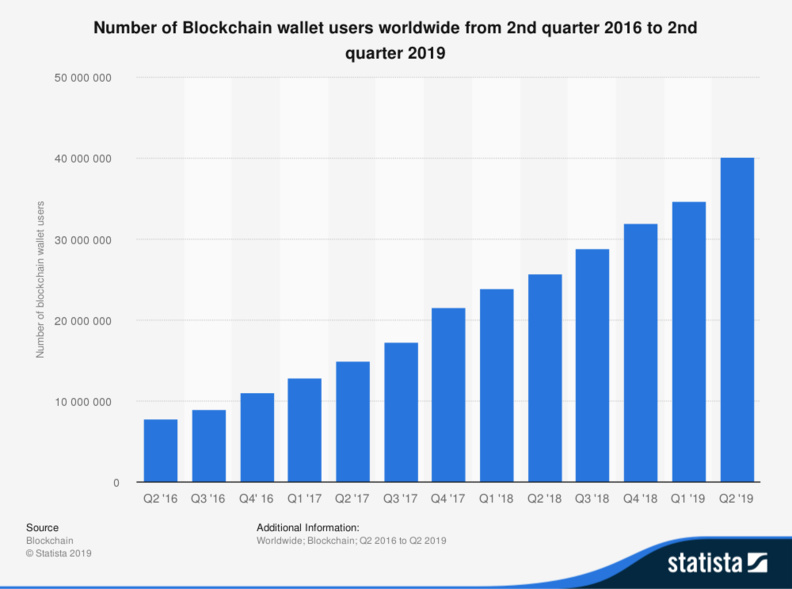What are the obstacles blocking the mass-adoption of cryptocurrencies?
17/12/2019
Ilias Louis Hatzis is the Founder at Mercato Blockchain Corporation AG and a weekly columnist at DailyFintech.com
There could be a tipping point for cryptocurrencies in 2020 according to a new report, by Nobl Insurance, that estimates at least 25 million Americans will own cryptocurrencies in 2020, approximately 10% of the population.
At present, there are more than 2,000 cryptocurrencies in the market. All these coins claim to be better than one another and solve some problems in different industries. The sheer number of alternative coins launched in the last 5 years show us, how fluid the market is and the number of experiments happening in the space.
There are a few stages for mass adoption to happen. The first was awareness, which was kicked off by the hyper-innovation stage that happened with the ICO craze. The current stage is institutional adoption. Libra is trying to open the way, by enabling institutional, political and regulatory acceptance. The next will be an easy and seamless experience for both users and institutions, where users don’t have to deal with the difficulties that come with today’s crypto technology.
More fiat to crypto on-ramps
The single biggest point of friction in crypto is the on-ramp. Moving from fiat to crypto requires an interaction with a centralized, regulated entity and going through AML and KYC, can lead to a huge drop off. The cryptocurrency prohibition policies aren’t necessarily motivated by an effort to protect consumers from misinformed investment decisions or credit card debt. Banks have been defensive when it comes to cryptocurrencies, as they are trying to build a moat around themselves, by not banking cryptocurrencies. This has made it more difficult for early innovators to bridge fiat and cryptocurrencies and to find trusted custody partners.
Better regulation
Some have been restrictive and hostile like China that banned ICOs in 2017 and clamped down on all cryptocurrency trading with a ban on foreign exchanges. Chinese regulators have taken steps to deter the use of cryptocurrency in the country, as they get ready to launch their own digital money. Other countries have been friendly and most, that don’t know what to do, have buried their heads in the sand, doing nothing. Western countries have been somewhat reluctant with the regulation of digital currencies. Some regulators do not understand the technology well enough to put in place suitable regulation laws. It has taken the US almost 10 years to take a stance through the IRS and SEC. Smaller countries like Malta have seen cryptocurrencies as an opportunity and have been leading the way, creating legal frameworks that support the crypto industry.
More Education
Most people do not know how cryptocurrencies work and can’t differentiate between blockchain and cryptocurrency. The learning curve for cryptocurrency is particularly steep. Learning about cryptocurrency and blockchain seem like an abstract concept that is almost impossible to grasp. Fear of not understanding how cryptocurrencies work is a huge deterrent for most people that want to get into the space. I really love Coinbase Earn, a system that provides free cryptocurrency by performing various educational tasks and viewing educational content. Education is a critical layer that must be addressed in order to achieve greater adoption. It would be great to see more initiatives like this, by some of the bigger exchanges.
Ease of use
Managing private keys is going to be a huge factor. The average person does not want to worry about losing their private keys along with their funds. Multisig, scorched earth vaults, uPort-style social account recovery, hardware wallets, are all good, but lots of work. Having to remember a 64 character seed phrase or writing it down on a piece of paper at risk of losing all of your money is a huge barrier to entry in today’s world of easy resettable passwords. IMO, the development of private key management services are without a doubt going to play an increasingly important role. The introduction of new wallets won’t bring adoption until users can buy, spend, and hold cryptocurrencies without having to understand cryptography and blockchain consensus mechanisms.
Stabilize Volatility
Facebook’s Libra project made it clear that we are moving towards the privatization of money. Stablecoins can open access to the 1.7 billion unbanked and poor. Stablecoins will bring in the masses, which that is the reason that central banks and governments are trying to make sure we never get to use Libra.
Improve Safety
According to Investopedia, $9 million is lost each day in cryptocurrency scams. It is because of this behavior that people and businesses forget about the benefits of blockchain and instead refuse to invest in a currency they see as ideal for criminals, terrorists, and money launderers. People need safety and an authority that can solve their issues when it comes to digital cash. In the decentralized systems, it is hard to track down the defaulters and punish them. Taking responsibility for frauds and reporting them is a tricky role. That’s one of the reasons why national governments do not talk about the regulations openly.
Integration with existing products
Interacting wallets into existing products can help bring crypto into mainstream. While we are seeing companies like Robinhood, Revolut, Square and others adding crypto functionality into their products, it is still very limited. Hopefully we will see companies like Apple, Amazon, Google and Facebook, with billions of users worldwide follow suit. If Libra manages to get off the ground, it might just be all that is needed.
Before we can make the jump to mass adoption, two things need to happen. Governments must create an enabling environment for cryptocurrencies. And we need to build better experiences, so less technical people can use cryptocurrencies, just like they use their phones, drive their cars and charge their credit cards, without necessarily understanding how they work.
He writes the Blockchain Weekly Front Page each Monday.I have no positions or commercial relationships with the companies or people mentioned. I am not receiving compensation for this post.
Subscribe by email to join the 25,000 other Fintech leaders who read our research daily to stay ahead of the curve.
I have no positions or commercial relationships with the companies or people mentioned. I am not receiving compensation for this post.
http://dailyfintech.com
Finyear & Chaineum
Recevez chaque matin par mail la newsletter Finyear, une sélection quotidienne des meilleures infos et expertises en finance digitale, corporate finance & crypto finance.
Read for free The daily newspaper Finyear & its daily newsletter.
Receive the Finyear’s newsletter every morning by email, a daily snapshot of the best news and expertise in digital finance, corporate finance & crypto finance.
————————
Chaineum :
Fondée en 2015, Chaineum est une boutique STO offrant une expertise de premier plan en matière d’ICO et STO, avec une vision stratégique orientée tant vers le métier de ses clients que sur la technologie blockchain. A ce titre, Chaineum a participé à la mise en œuvre de bonnes pratiques dans le secteur (ICO Charter, Security Token Network).
La division services blockchain de Chaineum, développe la technologie Chaineum Segment, une blockchain privée orientée objets.
About Chaineum:
Founded in 2015, Chaineum is a STO Boutique with a strong expertise in ICO and STO, and a strategic focus on both its clients’ business and blockchain technology. As such, Chaineum paved the way in the implementation of certain best practices in this sector (ICO Charter, Security Token Network).
Chaineum’s blockchain services division, is developing Chaineum Segment technology, an object-oriented private blockchain.
————————-
No Offer, Solicitation, Investment Advice, or Recommendations
No reference to any specific security constitutes a recommendation to buy, sell or hold that security or any other security.
Nothing on this website shall be considered a solicitation or offer to buy or sell any security, future, option or other financial instrument or to offer or provide any investment advice or service to any person in any jurisdiction.
Nothing contained on the website constitutes investment advice or offers any opinion with respect to the suitability of any security, and the views expressed on this website should not be taken as advice to buy, sell or hold any security. In preparing the information contained in this website, we have not taken into account the investment needs, objectives and financial circumstances of any particular investor.
This information has no regard to the specific investment objectives, financial situation and particular needs of any specific recipient of this information and investments discussed may not be suitable for all investors.
Any views expressed on this website by us were prepared based upon the information available to us at the time such views were written. Changed or additional information could cause such views to change.
All information is subject to possible correction. Information may quickly become unreliable for various reasons, including changes in market conditions or economic circumstances.





